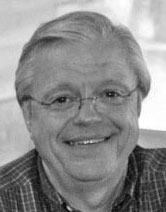It was a simple principle. And it worked.
The little red plastic car had a magnet in it. Another magnet was molded in the hand-held piece shaped to fit two fingers. Two tiny fingers.
“Remember how I showed you,” I recall her telling me. “Do it the way you’re supposed to, and it will work.”
I sighed and tried it again. The way she had told me to do it in the beginning. And just like magic, when I waved my hand over the toy car, it rolled across the tabletop. Propelled by the scientific principle of opposing magnetic fields.
My dad’s mom spent a lot of time with children. Her grandchildren, the neighbor’s children, anybody’s children who came to her house.
She had lots of practice. She did it most of her life. Born in 1905 and married at age 15, she was raising my father by the time she was 18.
My father was adopted by his brother and his wife in 1924 when he was not yet a year old.
The couple my dad knew only as mother and dad were biologically his aunt and uncle. My sisters and I knew them as grandmother and granddaddy. However, the family relationship would not have been any different by any other names. Nor could the love have ever been any stronger.
Raising kids and running a household was all that Granny ever knew. In her 88 years, she never had an employer and never drew a paycheck. But she worked seven days a week, loving her family, raising her child, and (to hear her tell it) helping raise other children — hers, her neighbors, her friends.
Nobody knows to what degree she actually “raised” them. But if she ever wiped their noses, fixed them a meal, refereed a disagreement or helped get them back on the “straight and narrow,” she laid claim to some part or parcel of their raising.
She was just that way. She helped where she was needed, giving of herself and what little she and my grandfather had to offer.
And it wasn’t necessarily a question of need. Most of “Granny’s kids” had good homes. They simply enjoyed visiting hers because of the warmth and love they found there.
I was fortunate. I had loving parents. But I was “twice blessed.” I had her for a grandmother.
During my childhood, she sometimes crafted toys from spools, paper, string and other improvised household items.
On rare occasions, we also frequented the toy store on Main Street next to the post office to splurge for a model kit.
That could be where the toy car I found myself playing with again last week came from. I just remembered it stayed in “my drawer” in her chifforobe. The same bottom drawer where some of my father’s old toys aged with mine.
As I grew from toy cars to real ones, she continued to help “raise me,” offering advice, solicited and otherwise, on navigating the perils of adulthood while enjoying the happiness of a life well lived.
When I decided to buy my first car at age 14, I told her all about a used 1951 Chevy I found, sharing with her my experience of going to the bank with my father to learn about financing. She promptly warned me about the evils of borrowing money. That it was better to “save up to buy what I wanted.”
“I raised your father better than that,” she added with a scowl.
She then pulled her “pocketbook” from its hiding place in the closet and gave me the money to buy the car. But only after making it plain that I was to make payments every week when I got paid at my new after-school job at Beall’s Department Store.
“You can just pay me,” she said. That way, “You don’t have to pay any interest.”
The toy car still works perfectly when I play with it. Employing time-tested scientific principles just like it did all those years ago.
I try it every now and then, just to think about her. Recalling philosophies about the happiness of a life well lived. Ideas from a century ago.
But still time-tested simple principles that work.

.png)





